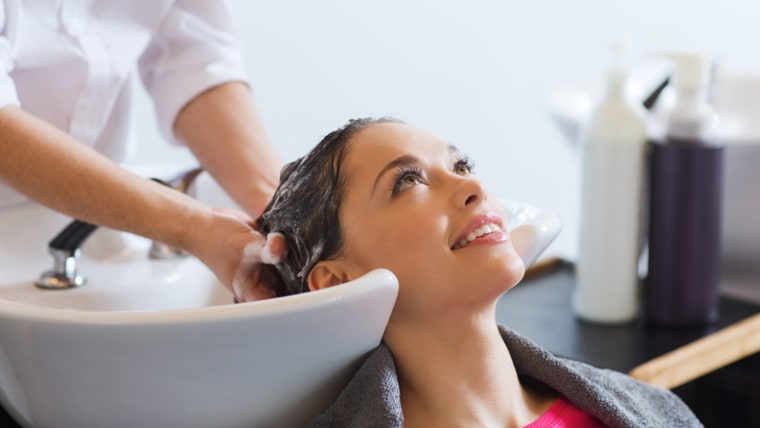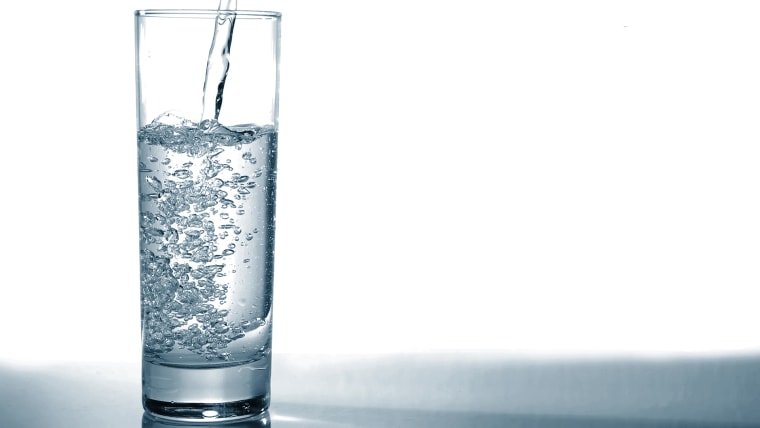The Internet can be helpful in looking up health symptoms and warnings. It can also spread health claims that have little to do with reality.
NBC chief medical contributor Dr. Natalie Azar joined TODAY’S Tamron Hall and Al Roker on Wednesday to clear up some intriguing health headlines getting attention on social media.
First, as always when you're reading health claims, if anything sounds too good to be true, it probably is. It’s very unlikely that any pill or drink will take the place of healthy diet, physical activity and sleep.
Also, beware of buzz words like “cure,” “miracle,” “instant” and “quick fix.”
The claim: You can have a stroke in a salon sink
This is actually a real — though quite rare — phenomenon called iatrogenic vertebral artery injury. It’s sometimes also referred to as the “beauty parlor syndrome.”
It happens when you rupture an artery in your neck that goes up into the base of the brain.
“An injury can occur here if you hyper-extend the neck,” Azar said. “Or with a rapid rotational movement. It’s a little controversial, but these things can also happen with chiropractic manipulation… as well as whiplash injuries.”

A similar neck risk exists for some yoga poses, as noted in research cited by The New York Times. Think about all the times you’ve thrown your head back in cobra pose or could barely breathe in shoulder stand with your chin tucked into your chest.
“Extreme motions of the head and neck… could wound the vertebral arteries, producing clots, swelling and constriction, and eventually wreak havoc in the brain,” the article notes.
You are at main risk for this if you have underlying atherosclerosis, or hardening of the arteries, because you are more vulnerable to compressing the artery when you hyper-extend your neck, Azar said.
Salon sinks that are cushioned and a little higher may be the solution. If you’re getting your hair washed and you feel uncomfortable or have a hard time swallowing, your neck may be too extended.
The claim: Drinking cold water after a meal can cause cancer
This is a myth.
The theory is that drinking cold water after a meal will solidify fats in food, which will eventually turn into fatty acids that can promote cancer.
“All of the steps of the myth appear to be untrue,” Azar said.
“No matter what temperature water you drink, as soon as you start drinking it, it’s going to go to body temperature and there are acids in the stomach that will break this stuff down.”

As an aside, the anchors were curious if you burn more calories when you drink cold water.
The answer is yes, but you won’t be impressed by the number: You’ll burn only about eight more calories, Azar said.
Related: Should you drink warm water or cold water when you wake up?
The claim: A colon cleanse can boost the immune system and increase energy
There is no evidence that cleansing your colon does this.
The theory is that any material that’s still left on the colon wall can release toxins into the blood and therefore poison you, a notion called autointoxication, Azar said.
There are two ways to do a colon cleanse: with the help of laxatives or using hydrotheraphy, where water is flushed into the rectum.
There aren’t many studies on this topic and there’s no real science behind the idea that we actually absorb toxins from our colon into our bodies, Azar said. Your body does a good job in removing waste already.
Related: Veggie diet lowers colon cancer risk
There can also be risks associated with a colon cleanse.
“People with heart disease and kidney disease have to be really careful about this. You can get dehydrated and have electrolyte imbalances,” she noted. “It’s not something that people in the GI field actually recommend.”
Bottom line: Unless you need to do so for medical reasons — to better see the inside of the digestive tract during colonoscopy or colon surgery — there's no reason to cleanse your colon.